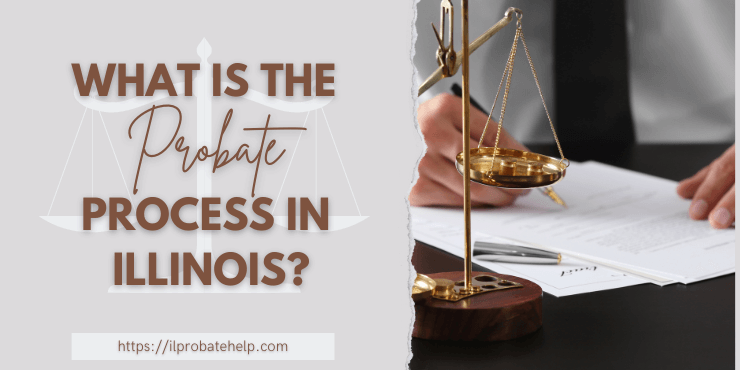After someone dies, the Illinois probate process is the legal process through which a decedent’s assets are transferred after their death. Its goal is to determine who will inherit the decedent’s assets and to ensure that all valid debts and taxes are paid. Probate is administered by the executor of the estate if there is a will, or by an administrator of the estate if there is no will. Let’s explore how the process works.

When is The Probate Process in Illinois Necessary?
The assets the decedent owned and how they maintained title to them will determine whether or not a formal probate action is required. It makes no difference whether there is a valid will or not. In the State of Illinois, a formal probate court action is required only if:
- The total of the assets exceeds $100,000, or
- The decedent owned assets solely, rather than jointly.
There is a specific list of assets that do not need to go through the probate process. These include:
- Those held in trust, such as a living revocable trust
- Real estate properties subject to an Illinois transfer-on-death deed
- Assets with designated beneficiaries (retirement accounts, payable-on-death bank accounts, life insurance, etc.)
- Assets owned in tenancy by the entirety or joint tenancy
The Death Probate Process in the State of Illinois:
This is how the probate process typically works in most counties in the State of Illinois however in some counties there may be a slight difference. Overall there are basically three major phases to the probate process:
- First Phase – Opening the Estate
- Second Phase – Administering the Estate
- Third Phase – Closing the Estate
Who has the Authority to Act as the Representative of the Decedent’s Estate?
An “executor” is the person named in the Will as the person who will administer the decedent’s property and debts to ensure that the decedent’s Will, as intended, is carried out. But what if the decedent’s will is outdated and the executor named in the will has since died or unable to or unwilling to act as the representative of the estate? What if there is no successor named in the will, or if the decedent died without a will then who can act as the representative of the estate?
In this case then Illinois statutes will determine who can act as the representative of the decedent’s estate.
The following is the primary order of preference as outlined in the Illinois statutes:
- The surviving spouse or any person nominated by the surviving spouse.
- The children or any person nominated by them.
- The grandchildren or any person nominated by them.
- The parents or any person nominated by them.
- The brothers and sisters or any person nominated by them.
- The nearest kin or any person nominated by them.
Once the qualified individual has been chosen there are some criteria that the representative must meet, they must:
- Be at least 18 years old;
- Be a resident of the United States;
- Be of sound mind and not be mentally incompetant;
- Not have been convicted of a felony.
How the Probate Process Starts – First Phase
The representative of the estate typically will hire a probate attorney that will file a petition to open probate on their behalf, and file the Will (if there is a Will) with the Clerk of the Circuit Court in the county in which the decedent resided at the time of death. The attorney is then given a court date, in which they will present the petition to the judge, and soon after the Letters of Office are issued to either the qualified “Executor” or “Administrator.”
The Letters of Office, or in some counties they are referred to as Letters of Testamentary, is an important document. It gives the representative of the estate the authority to access the decedent’s bank accounts, life insurance policies, and whatever other assets that were owned by the decedent.
Next, a publication notice is filed in a newspaper that the decedent’s estate is opened. It gives notice to the heirs and to any creditors who want to come out and file a claim against the decedent’s estate.
Lastly in the first phase of the probate process, if the decedent died without a Will a surety bond needs to be submitted to the court which insures that the probate process will go through properly and appropriately.

Second Phase – Administering the Estate
Once the representative of the estate has the Letters of Office or Letters of Testamentary, the key responsibility is to determine and administer assets and debts. The representative of the estate has to prepare an inventory of what was owned by the decedent, search for the decedent’s assets and debts, obtain appraisal of all assets, and confirm validity of all debts. In addition, the representative of the estate may need to liquidate some assets to pay valid debts. Many times the house owned by the decedent is the largest asset of the estate and will need to be cleaned out and sold.
The representative of the estate is also responsible for resolving all claims and debts against the estate, resolving any inheritance issues, and sending out an initial distribution to the beneficiaries if they choose to.
Paying Taxes
Separate from the deceased person, the probate estate is a tax-paying entity. Therefore, the executor must get a taxpayer ID number for the estate from the IRS, which will be used to report income and gain (as well as deductions) during the estate’s administration. In addition, the estate must file state and federal income tax returns (IRS Form 1041 and state form IL-1041).
What Happens If Another Party Contests The Will?
The good news is that most probate cases are simply paperwork that takes around a year to complete. However, if family or other beneficiaries disagree about the Will or the assets, probate can take much longer and cost more money. If a legal struggle does break out, it will most likely be in regards to:
- Language in the Will that is confusing
- Claims made by creditors
- A claim that the deceased individual was improperly influenced or lacked the mental ability to write a valid will
- The executor’s claims of misconduct
- If there is no will, the statutes of the State of Illinois governs the identity of the heirs
Concluding The Probate Process – Closing the Estate
The representative of the estate prepares a final statement and accounting that indicates how the estate’s assets were handled before the estate can be declared closed. It is submitted to the court and beneficiaries for approval. Then the representative distributes the net estate to the beneficiaries according to the decedent’s Will, or Illinois statutes if there is no will. A court date is then set to close the estate and discharge the representative of the estate to stop any further liability.
If you would like more information on the probate process in Illinois, please contact me for a no obligation consultation. I would be happy to discuss your specific situation and help you navigate these difficult waters. My name is Maria Mastrolonardo, I am a Illinois Certified Probate Real Estate Specialist with RE/MAX Enterprises. This is ALL I do; I help guide families through the process of selling real estate in probate and I would be happy to help you as well.
Call me today at: (630) 248-6077, or email me at mmastrolonardo@remax.net
